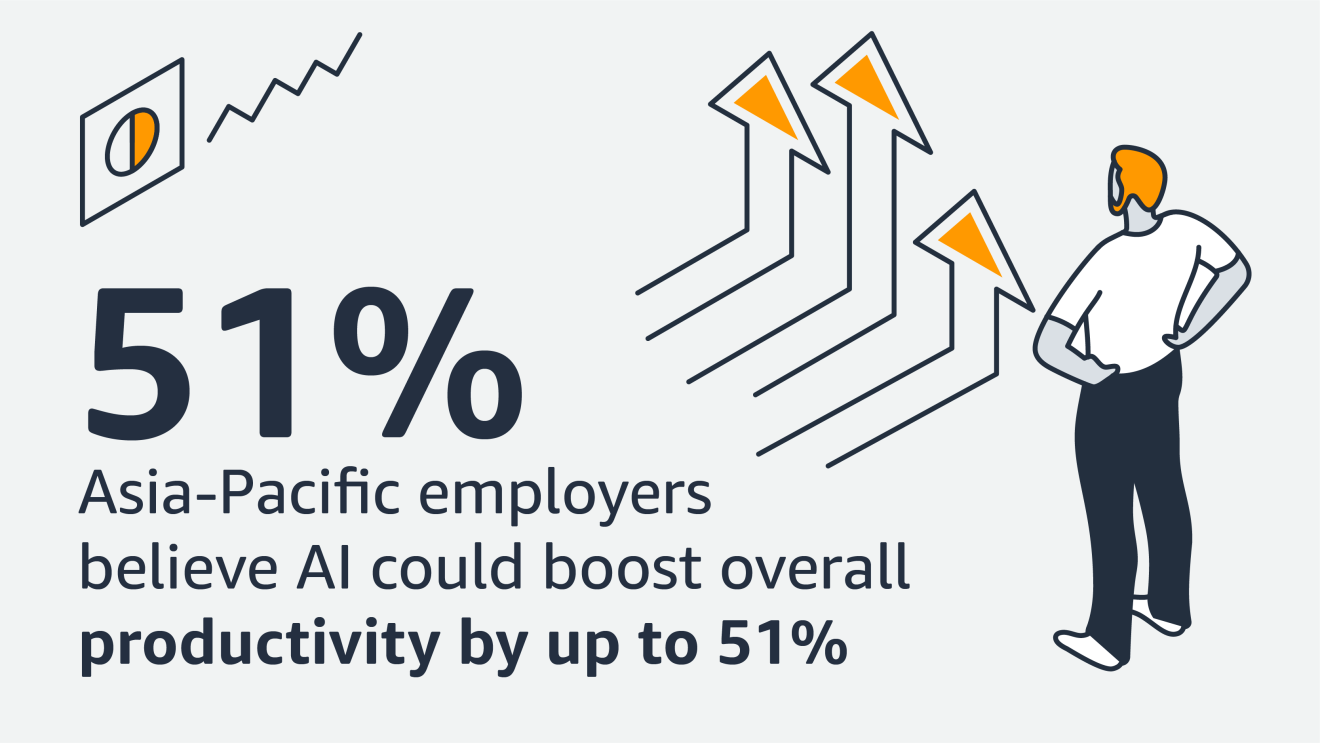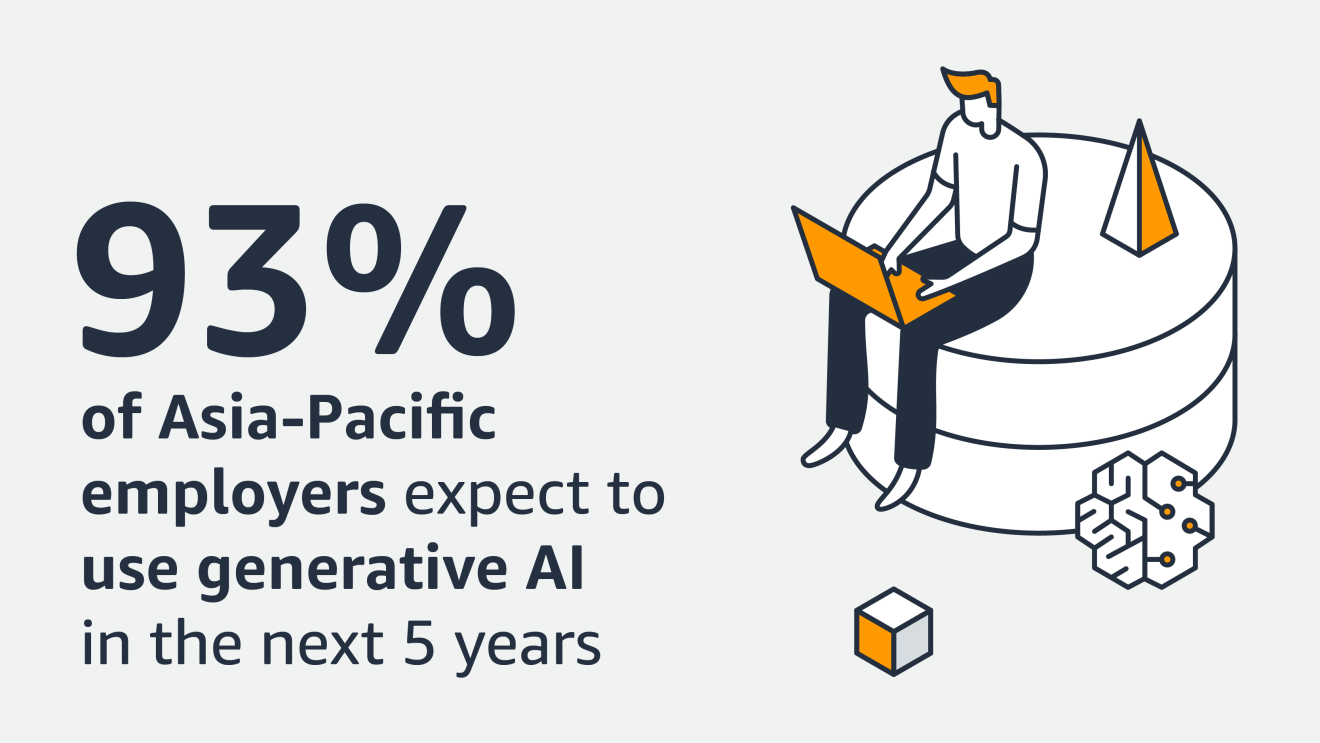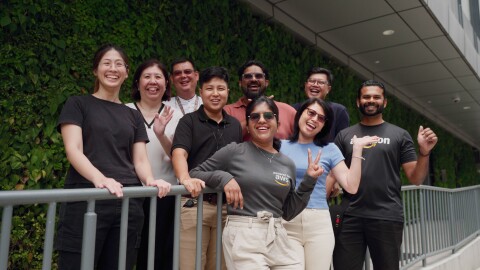Artificial Intelligence (AI) is reshaping the workforce in Asia-Pacific (APAC)—from how organisations operate to how work gets done. Despite the varying levels of AI adoption across countries in the region, the technology will be a game-changer over the next five years.
AI taps into the power of computers and machines to mimic the problem-solving and decision-making capabilities of the human mind. As smart algorithms and automation sweep through industries, the APAC employment landscape is evolving, with humans and machines collaborating like never before. AI is pushing both employers and workers to adapt for a more dynamic workforce and greater productivity.
To better understand emerging AI usage trends and where workplaces might be headed, Amazon Web Services (AWS) commissioned global research firm, Access Partnership, to conduct an Asia-Pacific AI skills survey. Almost 15,000 employees and nearly 5,000 employers were surveyed across Australia, India, Indonesia, Japan, Malaysia, New Zealand, Singapore, South Korea, and Thailand.
The study, titled Accelerating AI Skills: Preparing the Asia-Pacific Workforce for Jobs of the Future, shows that AI transformation is happening at a rapid pace, with the majority of APAC employers expecting to use AI solutions and tools in their organisations by 2028.
Here are the five key takeaways:
1. AI skills could boost pay and accelerate career growth for workers

With considerable potential to improve operational efficiency, worker productivity, and decision-making, surveyed employers in APAC indicated that they are willing to pay higher salaries to workers with AI skills and expertise beyond the IT department. While employers are willing to pay 44% more for IT workers with AI skills on average across the nine APAC countries, they would also pay a salary premium to skilled workers in research and development (41%), sales and marketing (39%), business operations (39%), finance (37%), legal (33%), and human resources (33%).
On top of significant salary bumps, four in five (83%) surveyed APAC workers indicated an interest in developing AI skills to accelerate their careers, and the study found that this interest transcends generations. While 87% of Generation Z, 88% of millennial, and 79% of Generation X workers want to get equipped with AI skills, 68% of baby boomers—a demographic usually contemplating retirement—say they would enroll in an AI upskilling course if employers offered it. Overall, 93% of workers anticipate that having AI skills would have a positive impact on their careers, including increased efficiency, higher job satisfaction, and faster career progression.
2. The productivity payoff from an AI-skilled workforce could be immense

The productivity payoff refers to the tangible benefits the APAC region stands to gain from the full adoption and integration of AI tools by workers.
Surveyed employers expect their organisation’s productivity to increase by 51% as AI technology automates repetitive tasks (64%), improves workflow and outcomes (60%), and enhances communication (59%). Workers believe AI could raise their productivity by as much as 50%.
3. Most organisations will be AI-enabled by 2028 and expect to benefit from it

Over the next five years, the speed of AI transformation across APAC will be remarkable, with 92% of employers envisioning their organisations to be AI-driven by 2028. While most employers (91%) believe their IT departments will be the biggest beneficiary, they also expect business operations (89%), finance (88%), research and development (88%), sales and marketing (87%), legal (82%), and human resources (81%) to benefit too.
Delving into key industries in the region, the research shows the IT and Telecommunications sector is leading the charge on AI adoption, with 97% expecting to use AI tools by 2028, followed closely by the Banking & Financial Services industry (95%), and the Public Sector (91%).
4. Generative AI tools will become commonplace at work over the next five years

Generative AI—a type of AI that can create new content and ideas quickly, including conversations, stories, images, videos, music, and more—has captured the attention of the general public in the past year, and will transform how people work. So, it’s not surprising that nine in 10 APAC employers (93%) and workers (90%) expect to use generative AI tools on the job within the next five years. 67% of employers highlighted increasing innovation and creativity as the top benefit of generative AI, followed by automating repetitive tasks (61%), improving outcomes (58%), and supporting learning (56%).
5. Bridging the AI skills gap through training is mission-critical

Hiring talent with AI skills and expertise is a priority for 79% of surveyed APAC employers, of which 75% can’t find the AI talent they need. The research also uncovered a training awareness gap, whereby 79% of employers indicated that they don’t know how to implement an AI workforce training program.
On the workers’ side, 71% don’t know what AI skills they need, 74% lack knowledge about available training programs, and 74% aren’t sure about the relevant career paths where AI skills would be useful.
While employers consider technical skills essential for using AI, they also rank creative thinking (57%), critical thinking (53%), and ethics (36%) as important soft skills for working with AI. Ethics and risk management are vital for guarding against potential AI risks, including algorithmic bias, lack of accountability, compliance challenges, and the need for transparency and safety measures.
Building an AI-ready workforce is everyone’s responsibility for future prosperity across APAC
Overall, this important research on AI and the future of work reveals a looming AI skills gap across APAC that must be bridged so the region is well-positioned to unlock the full benefits of AI. This calls for greater collaboration between governments, industries, and educators to help employers implement AI training programs and guide workers in matching their AI skillsets to the right roles to harness their newly acquired AI capabilities, and make the most of this evolving technology.
In November 2023, Amazon launched the ‘AI Ready’ initiative that complements AWS’s commitment to provide free cloud computing skills training to 29 million individuals globally by 2025. Through ‘AI Ready,’ we now offer a suite of free AI and generative AI training courses, aligned to both technical and non-technical roles, so that anyone can build AI skills.
AWS also announced new generative AI innovations at AWS re:Invent 2023, including Amazon Q—a new generative AI assistant designed for work that can be tailored to businesses. This highlights the need for workers to be equipped with AI skills, in order to unleash the full potential of generative AI innovations.
AWS is proud to have trained more than 8.3 million people across Asia-Pacific and Japan with cloud skills since 2017. With the rapid adoption of cloud-enabled technologies like generative AI, more work needs to be done to build an AI-skilled workforce to unleash a culture of innovation and drive productivity in this dynamic region of the world.
Learn more about the Accelerating AI Skills: Preparing the Asia-Pacific Workforce for Jobs of the Future report.












